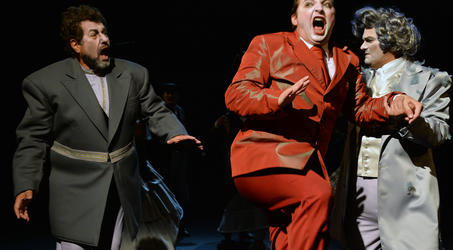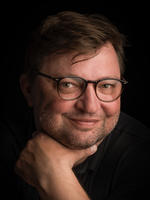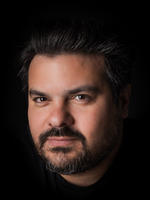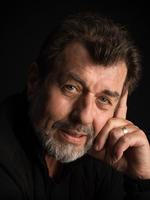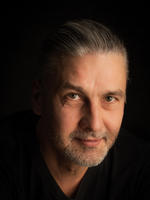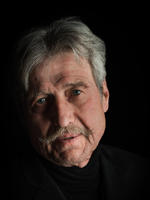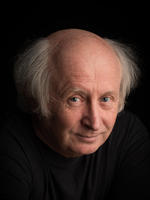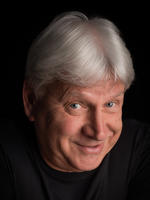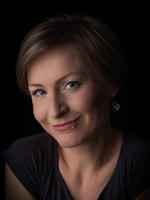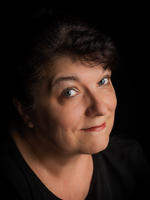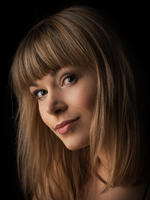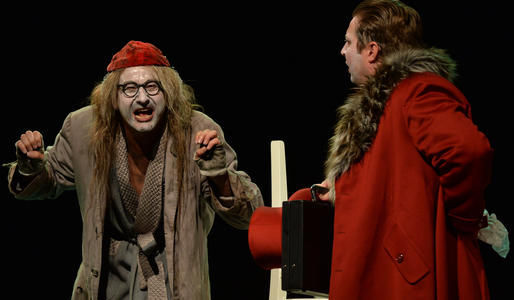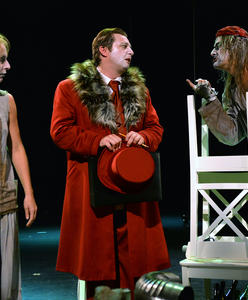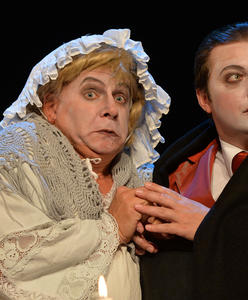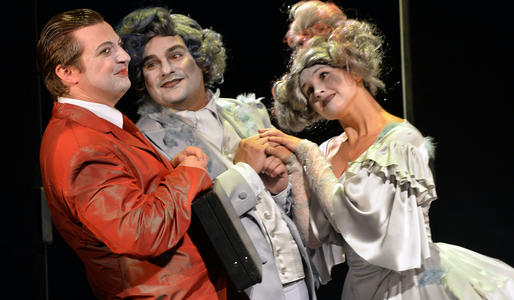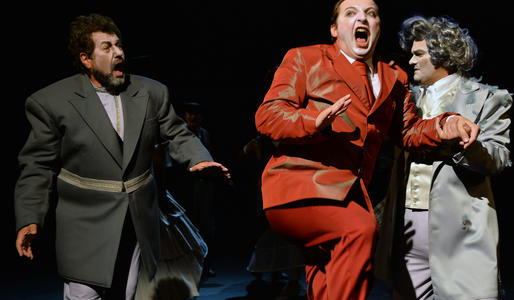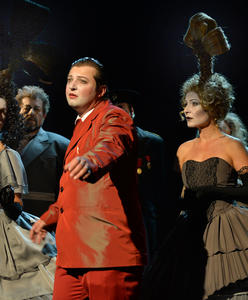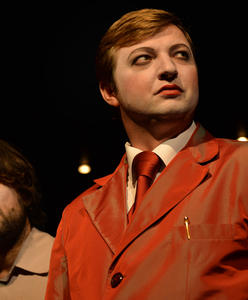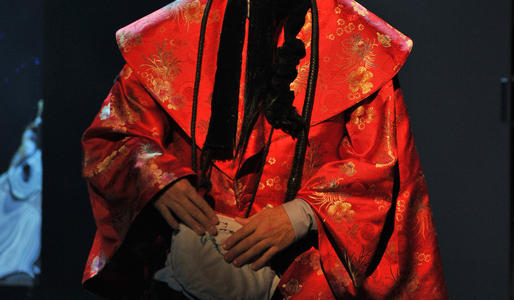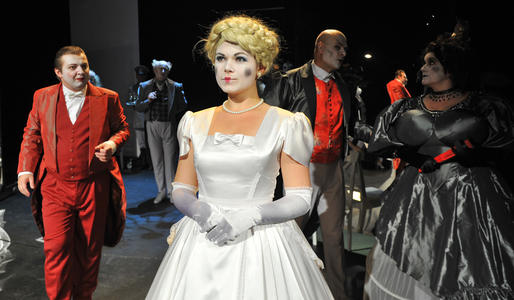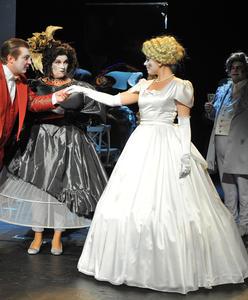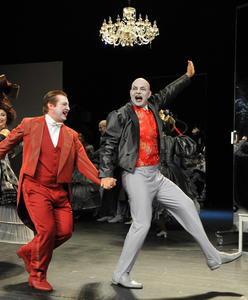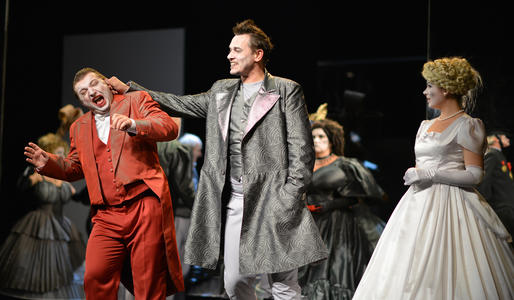DEAD SOULS AT BRNO CITY THEATRE
Jana Soprová 12. January 2015 zdroj www.scena.cz
This is only the fourth time that Gogol´s novel Dead Souls has appeared at Bohemian and Moravian theatres. The last time but one was ten years ago at the ABC Theatre. It was directed by Aleš Bergman, who used Mikhail Bulgakov´s adaptation. It isn´t very easy to capture the rich typology of the characters of large landowners and the Russian society which Gogol describes so impressively due to the lavishness of the images which he uses. It is even less easy to do it a way that shows how echoes of the Imperial Russian institution of serfdom still resonate today, and demonstrates the parallels between Russian society then and now. All of this was attempted at Brno City Theatre by the creative duo from the Prague Divadlo v Dlouhé Theatre, director Hana Burešová and playwright Štěpán Otčenášek, together with other allied authors and Brno actors. Hana Burešová has been cooperating with Brno City Theatre regularly for many years and her productions here always bring interesting colour to the repertoire of the theatre – and the case of Dead Souls is no exception.
The dramatization openly references the original literary work by including Chichikov´s internal monologues alongside the dialogues and group “action” scenes: estranging comments on the character himself exit his mouth as if they were coming from somewhere else. Genre-wise, this comedy keeps the Gogolesque bizarre poetic vision of the original, combining grotesque situations with lyrical descriptions of the beauty of Russia and Chichikov’s somewhat pathetic, prophetic exclamations. At the same time, it doesn´t omit the macabre character and eerie mysticism which also has its place in Gogol’s work. The stage arrangement by Tomáš Rusín is economical and practical – for the majority of the time, he gets by just with several chairs which are not only for people to sit on but are also cut up or formed into various shapes. The evocation of a Russian troika is an impressive and yet simple element which is created only by a couple of reins which create the impression that the horses pulling the sleigh are the spectators in the first rows. In the visually distinctive dream scene, where various almost surreal images of distorted reality appear before the protagonist’s eyes, the scenographer made use of mirrored surfaces which give the characters distorted dimensions as they reflect them. Michal Isteník dominates the stage in the role of Chichikov. Some of his gestures and ways of speaking will remind spectators of the distinctive Donutil style of acting. Even so, Isteník is himself a powerful comedy talent that audiences love to see. The other actors clearly enjoy the smaller yet distinct studies of the individual kulaks. Let´s name, for example, the bearishly clever Psovski played by Zdeněk Junák, Alan Novotný’s lyrically oversized Manilov, reminiscent of Karel Gott´s specific tone colour, the scarecrow-like, disgusting scrooge Plyushkin (Patrik Bořecký), and Petr Štěpán’s cunning drunkard and card gambler Nozdrev, who leaps into action with dangerous and unpredictable verve, exposing - as if by chance - not only local maladies but also Chichikov himself. Jan Mazák’s widow Korobochka is almost like Baba Yaga in the Russian fairy tale movie Morozko (Jack Frost). Practically all the members of the numerous acting ensemble successfully maintain a similar level of small-town petit-bourgeois bizarreness. As a whole, the production makes a presentable impression, Brno City Theatre’s acting team shows a welcoming folksiness combined with unrestrained grotesque theatricality and it is obvious that the actors are following the guest director’s well-thought-out concept for the production with joy and esprit.
GOGOL – OUR CONTEMPORARY
Vít Závodský 10. November 2014 zdroj Týdeník Rozhlas
The contradictory legacy of Nikolai Vasilievich Gogol tends to be viewed from a variety of different perspectives. Director Hana Burešová and dramaturge Štěpán Otčenášek chose a very suitable angle for their original dramatization of the unfinished novel Dead Souls, which was shown as a Czech premiere at Brno City Theatre. This famous work of prose about a speculative attempt at fraudulent enrichment is presented by Burešová and Otčenášek in a way that captures the topicality of the author´s socio-critical view, which encompasses the current situation in Russia as well as the more sophisticated corruption scandals occurring in our country. The thoughtful cautionary tale and inventive set are built on distinctive stylization and grotesque exaggeration. Michal Isteník excels in this cabaret revue as the chameleon-like crook Chichikov; his acting is well-balanced despite the sharp transitions between playing the character himself and his function as the commentator.
BRNO’S THEATRES HAVE PRESENTED THEIR NEW PRODUCTIONS, OF WHICH DEAD SOULS IS THE BEST
Jana Soukupová 24. October 2014 zdroj MF Dnes
October has seen a rich array of offerings presented on Brno’s theatre stages. The created works included a fantastic theatre experience based on a Gogol novel, a folk version of Krkonoše Fairy-Tales, a completely average production of a political novel by Ladislav Mňačko, a version of the Nutcracker ballet featuring opulent design and a great number of characters, and a professional performance of what was originally a film romance, Ghost.
A theatrical experience from Gogol
This classic by Nikolai Vasilievich Gogol, about a conman who travels around the Russian countryside buying up “dead souls”, i.e. muzhiks who are dead in reality but still registered as existing, was staged for Brno City Theatre by director Hana Burešová and her partner, the dramaturge Štěpan Otčenášek. With their devoted and eager actors they have managed to make the play a real happening. The role of slyly calculating Chichikov suits sure-footed actor Michal Isteník to a T, but all the other members of the cast also demonstrate with flair that when they’ve got something worth acting, even small tasks like a show of communal harmony can be raised to the level of a great theatre experience.
If we add to this the comprehensively effective on-stage depiction of the “dream of the Russian soul” which, in the spirit of Gogol, also warns against the reverse side of it, we have a contemporary-seeming, dramatically precise and unusually effective theatre version of a literary work which has previously proven a tough nut to crack for many in the world of theatre and film.
The play basically deserves a top rating, only losing an insignificant five percent from the total hundred for falling prey to the error so typical of theatres today of thinking theatregoers’ feelings have become so blunt that it’s necessary to turn up the emotion dial a little higher than necessary. But here it really is only a teeny-weeny bit.
DEAD SOULS HAVE EVERYTHING BLOWN OUT OF PROPORTION IN BRNO
Luboš Mareček 20. October 2014 zdroj www.echo24.cz
Director Hana Burešová has turned a classical piece into entertaining and chillingly current theatre in the case of the production Dead Souls, and Brno City Theatre, where the dramatization of Gogol´s well-known unfinished novel was shown, can put it down as a successful entrance into a new season. It isn´t just another year at the theatre: Brno City Theatre will commemorate seventy years of its existence at the end of it, and on top of that, the first decade of the Music Theatre will also be celebrated. Burešová has already opened several seasons with her productions at the theatre’s Drama Theatre. These have almost always been interesting dramaturgical excursions or novel directorial successes.
Burešová has got together with her court dramaturge Štěpán Otčenášek to re-write the famous work by Gogol into a script. In well-composed and uniform style, the director has evoked the frowning grotesqueness of Dead Souls, leaving out a bit of the omnipresent Russian elegiacness and gloom in order to move the production towards the present day without any forced updating.
The production is a panoply of great acting as well as a presentation of the skillful cooperation of all the other components of the drama: the scenography, the costumes, and the music by Petr Hromádka.
It was enough to reach into the fragments of the second part (Gogol conceived the novel Dead Souls as a trilogy but he burnt the second part leaving only a few fragments and didn´t write the third part at all) and ask through the mouth of the main protagonist: Where are you flying, Russia, do tell? She does not answer. (…) Russia is rushing forwards and other nations are stepping aside unwillingly…
This harsh and meaningful sentence was uttered by the central hero, Chichikov, who wants to get rich by buying fictitious dead serfs, and then use them as collateral to obtain a loan from the bank for further business. The clever conman pushes his way through to the notables of a certain city called N., and afterwards goes round the local Russian landowners buying up all the de facto deceased but de jure living people he can. Chichikov´s grotesquely realistic journey is also a parable full of disgusting human characters produced by a social system riddled with bribery, corruption and ruthless greed, as well as being marked by the absolute means by which the enslaved serfs are ruled.
Burešová and her production team have created great comedy from the bizarre types which meet the crooked Chichikov. Michal Isteník had a hard task in the main role because he sometimes breaks character and talks about himself, and on top of that he also at other times functions as a narrator and makes comments on the plot. Isteník is capable of expressing all these three levels with the use of his exceptional talent for comedy. Burešová models this story of a crook as a cabaret entry at first. Chichikov tricks the people around him, literally pouring cards out of his sleeves onto the stage. Isteník can be flattering, full of excuses and seemingly polite, as well as ruthless and pragmatically shrewd.
Burešová´s production is a panoply of great acting as well as a presentation of the skillful cooperation of all the other components of the drama: the scenography, the costumes and the music by Petr Hromádka. To suggest the concept of a social circus, Tomáš Rusín has placed six black movable screens on the stage to create the illusion of an unpredictable labyrinth, a variety show or a hall of mirrors. Burešová uses a minimum amount of furniture and thus Zuzana Štefunková-Rusínová´s costumes have more room to shine on stage. She has, for example, expanded not only the women’s wigs to great size, but also the bosoms of the presented notables as well.
Gentlemen with hanging underbellies are not relegated to the background, either, and why should they be. Everyone exaggerates and everything is literally blown out of proportion. And so it can easily happen that Chichikov, after being exposed, finds himself within a bizarre dream in which he is asked to dance by a whole parade of fairy-tale figures and the spectators then witness one of the best scenes of the evening.
As has already been mentioned, one of the strong points of the production consists in the precisely constructed and caricatured types it features. Aside from Isteník, Petr Štěpán provides a remarkable and stunning portrait of a wild and noisy drinker. The actor literally radiates energy. Alan Novotný´s Manilov makes the audience explode with laugher with his sickly-sweet study of a foolishly exalted philanthropist. Korobochka, played as a transvestite by Jan Mazák, attacks the sensibilities of the audience not only with her chest, which is as massive and saggy as her balloon-like bottom, but mainly with her exemplary demonstration of female stupidity. The actors do somewhat devastate the female dressing room here but one can say with clear conscience that at least the acting’s good.
Burešová provides great entertainment for theatregoers with this over one-and-a-half-century-old masquerade and confirms the proverbial timelessness of the original with casual hyperbole. The audience doesn´t only laugh at the bitterly witty comedy from old Russia but will also certainly realize that many of these character types still exist even today, and the aforementioned ending connects these Dead Souls with the present. Gogol isn´t transformed into a visionary through forced updating here, Burešová only spells out, chillingly and exactly, what this Russian classic can mean for us at the beginning of the century we live in today.
DEAD SOULS AT BRNO CITY THEATRE
Peter Stoličný 20. October 2014 zdroj www.i-divadlo.cz
It wasn’t the first time that director Hana Burešová had guested in Brno. She received the Alfréd Radok Award for the production of The Death of Paul I in 2008, and she also staged Dumas´ The Three Musketeers in 2008, as well as the beautiful piece School, the Foundation of Life, which was based on the novel Students and Teachers, in 2011. The interests of the director are varied, as is her direction (often in cooperation with dramaturge Otčenášek) but they have one common feature: they can describe situations exactly via simple directorial devices. They are based on the art of acting. The main role in Dead Souls is, of course, that of Chichikov, the collector of non-existent serfs. Michal Isteník enjoyed expressing all the nuances of the “genius” crook and is supported successfully by the robust Zdeněk Junák in the role of Psovsky, Patrik Bořecký in the character of Moliére-style scrooge Plyushkin, the bon viveur who keeps on betting, Nozdrev, who is acted vividly by Petr Štěpán, the corrupt governor played by Viktor Skála, Miloslav Čížek´s prosecutor and Zdeněk Bureš´ postmaster with his beautiful conspiracy theories as to who this Chichikov actually is. The “ladies” make a grotesque appearance alongside the gentlemen, too. There’s Jana Musilová as the prosecutor´s wife, then there’s the governor´s wife played by Lenka Bartolšicová, who is trying to get her daughter married (there’s a very obvious similarity with the play The Government Inspector here), and the governor´s daughter Eliška Skálová, again “lifted” from the Inspector.
The simple set by Tomáš Rusín and the costumes which Zuzana Štefunková-Rusínová created with pleasant exaggeration both certainly have a share in the success of this well arranged and meaningful production. The experienced Peter Hromádka was responsible for creating the musical atmosphere. He has recently been employed by producers both at Brno City Theatre and at Reduta National Theatre, as well as at Goose on the String. The composer has seemed right at home whatever the production he’s been involved in.
It was emphasized at the beginning that Dead Souls go somewhat further than the grotesque Government Inspector, and it really is so - director Hana Burešová lets spectators feel the hopeless awkwardness of the protagonists. The audience finds itself laughing, even though the characters are not actually as funny as all that. The humour is savage, even sad. It is Gogol, his unstable mentality, his sadness which resulted even in the burning of an incomplete part of Dead Souls. Gogol took the whole story seriously and the grotesqueness surfaced as the product of his despair over the state his society was in. It is good that the producers of this work have avoided cheap satire. Dead Souls has thus become a testimony of that time – a testimony which is (unfortunately) very topical today.
BRNO´S DEAD SOULS
Jaroslav Štěpaník 14. October 2014 zdroj www.literarky.parlamentnilisty.cz
Gogol’s famous novel Dead Souls, an incisive satire dealing with the conditions in Russia during the author’s lifetime, as well as the characteristics of Russians in general, has been adapted for the stage by director Hana Burešová. It was a collaborative effort with Štěpán Otčenášek, who is also the dramaturge for the production. Brno City Theatre opened the new theatre season with a premiere of this play.
The plot of the novel gives a spot-on portrayal of many aspects of our own contemporary Czech and Moravian reality, which is still not completely “dead”. We ourselves have also seen more than a few business people with cunning projects in this part of the world, we have become acquainted with both dead souls and whale hunters, and know that white horses are not only found in a Russian troika.
The director has totally and justifiably avoided any ‘updating’ of the material to include present day realities. She presents the story of a buyer of dead souls with grotesque Gogolesque exaggeration in such a way that the spectators can perceive features and characteristics which are not only specifically Russian but also can be seen in our country and in fact everywhere, in all humans: things which are funny and deserve to be laughed at. While the soul buyer is looking for and finding sellers, a range of grotesque characters is presented to the audience (including the person who is the main character and story narrator in one). The director managed to balance the performances of all the actors from the drama ensemble perfectly. Each of them maintains the same common level of comic caricature while depicting the individual features of the characters. None of the actors “overplays” their role. The production places emphasis on the complexity of acting, the important components of motion, pantomime and expression. “Clown-like” whitened faces, wigs, and extravagant hairstyles and costumes all work together to reinforce the comic exaggeration.
Brno´s Dead Souls gave ample opportunities to Michal Isteník to show what he can do. He maintained perfect harmony with all the other actors, without exception. The depiction of the characters, with all their variety and their shared hypocrisy and worries about the possible consequences of their evil, is a successful one. It would be perhaps unjust to point out anyone from the ensemble in particular. The actresses didn´t have as much space as the men but they attracted theatregoers’ attention through their movements and their witty costumes by Zuzana Štefunková-Rusínová. Varied original music with a “Russian flavour” (Petr Hromádka) completed the atmosphere appropriately.
The director used the simple stage arrangement by Tomáš Rusín inventively. Their idea to combine clever lighting with an actor sitting on a simple chair with a harness in his hands to create an image of a Russian troika barrelling through the endless plains of the vastness that is Russia was perhaps the most attractive.
When the nature of the business of the main “hero” is revealed, the inner thoughts of the various local “somebodies” are exposed for all to see. They have a panoptic meeting accompanied by the inevitable chain consumption of vodka. All those present are consumed by worry and reach absurd conclusions about who the newcomer might really be, and what could be hidden behind his arrival, and what he could reveal (and there is a lot). The play, with its introductory and final words, is clearly set in the Russian context, and the whole plot reveals a great deal of characteristic features of Russia and the Russian people. However, a lot of what Gogol managed to laugh at in his countrymen has a far wider scope, being relevant to other nations including our own land and its multitude of souls, both dead and alive.
Dead souls makes a succescful entrance into the new season
Jaroslav Štěpaník 1. October 2014 zdroj www.brnozurnal.cz
Hana Burešová is staging the story of Chichikov, buyer of dead souls, and she’s doing it in the true spirit of Gogol, with grotesque hyperbole. During the process of seeking and finding sellers she treats the audience to an almost panoptic parade of characters. The director has managed to fine-tune the acting ensemble in such a way that each character creates a distinctive and individual impression via clear character traits while maintaining the same level of comic hyperbole. None of the actors “overplays” their role. This is not a solely or mainly verbal interpretation of Gogol’s work, with the emphasis rather being placed on the creation of harmony between the spoken word and movement, pantomime and mimicry. (Facial mimicry plays an important role, with the spectators in the first rows able to gain the most enjoyment from the experience.) The director’s intention was underlined by the “clown-like” whitened faces, wigs, distinctive hairstyles and costumes that adorned the performers. Michal Isteník was excellent – I wouldn’t be surprised if his performance in the role of the cunning soul buyer Chichikov was nominated for some of the yearly theatre awards, the production too for that matter, though it is a bit early for such speculations as the season has only just started. All of the actors deserve praise, without distinction, as they all seconded the main character of this absurd story in excellent fashion. Zdeněk Junák was great as a Russian bear, Petr Štěpán excelled as a beautifully bothersome and friendly drunkard, and Jan Mazák performed his female role well and with relish…. Basically, all of the actors in this superb production should be named. The actresses didn´t have so much to do, so they gained the spectators´ attention through their movements and their witty costumes by Zuzana Štefunková-Rusínová. They brightened up the introduction to the second half of the performance, contrasting with the monotonous but entertaining wandering of the soul-hungry serf-buyer who was at the same time mapping the living souls of the local celebrities. The Russian-style music in a variety of forms (Petr Hromádka) suitably complemented the whole atmosphere.
The simple stage arrangement by Tomáš Rusín was fully utilized by the director. The use of reins while sitting on a simple chair was inventive, giving the illusion of riding in a carriage, no doubt pulled by a Russian troika. A race between two teams of horses hurtling towards the auditorium was made very impressive with the use of such simple devices. A constellation of meetings with various, always somewhat distorted, characters, generally hypocritical by nature, is followed by a scene at a ball after a sudden reversal of fortune is brought about by a drunk (how else) and undesired messenger of truth, Nozdrev (P.Štěpán). Descriptive and also somewhat scary was the scene where vodka was consumed and all the important local inhabitants wallow in their worries as to who the unknown person that has arrived might be, and what can be behind his arrival. The play begins with some kind of prologue and finishes with something like a summing up, a concluding message. The whole play is brimming over with distinctive sketches which are characteristic of Russia and the Russian people and which we perceive sharply and sensitively given our experience in history. It needs to be appreciated that the play hasn’t succumbed to the temptation to engage in “cheap” updating, drawing neither from internal political folklore (whaling, the purchase of dead souls) nor from the current political situation.
It needs to be added that some of the aspects of Russia’s national character which are criticized by Gogol can also be found within other nations, including our own Czech and Moravian souls, both alive and dead. People have much more in common that transcends the boundaries of nationality than that which remains exclusive for one community.
We laugh with Gogol not only at Russian megalomania but also at human pettiness, hypocrisy, falsehood, and the act of kneeling down before something unknown yet reportedly great. We are laughing also at ourselves.
JUST WRITES TO REJŽEK
Vladimír Just 30. September 2014 zdroj Divadelní noviny
So, I’ve been to see the premiere of the latest opus by Hana Burešová and Štěpán Otčenášek, a directorial and dramaturgical duo that usually starts the theatre season in September not at their home Theatre on Dlouhá St but at Brno City Theatre. And thanks to them, I can continue with the Russian tone of your letter: one almost can’t believe that not only Babel and Olesha, as remembered by you, but also old Gogol can be brought devilishly up-to-date. His monumental work Dead Souls, which was planned to extend over three parts (hell- purgatory-paradise?), and from which we know only the first part completely as the Master didn´t manage to write the rest, and whatever he did manage, he burned, seemed to me after three hours of terrible boredom at the National Theatre (1975) to be undramatizable. However, on seeing what I saw in Brno at the premiere on 20th September I can now consider Dead Souls a contemporary piece – a symbolic expression of today´s decay. The end of the production brings a surprisingly chilling expression of our current real worries about that unpredictable country which “doesn´t appreciate jokes and has stretched across half the world. (…) Sleigh bells ringing beautifully, tearing through the air with all the vehemence of a gale, Russia is rushing forwards and other nations are stepping aside with displeasure…” This is what Chichikov says, with Michal Isteník´s stunning delivery, and he also manages to evaluate both his embarrassing role in the story and comment on the poverty inside us in the audience (he receives significant help from Zdeněk Junák as the typical Russian bear Psovski, Petr Štěpán as Nozdrev, an aggressive, jovial individual who also happens to be an informant, Jan Mazák as an unbelievably convincing lady, Korobochka – I apologize to the others). And what else is the basic commodity of dead souls than a metaphor for the absurdity of today, when everything can be exchanged – even things which don´t exist. Dead muzhiks have no useable value but, despite this, can become goods in a clever business plan: non-existence as a basis for existence, disguise as a source of wealth and prestige. Nevertheless, Chichikov isn´t a mafia boss but rather a small entrepreneur in the field of fraud – his soul scam isn´t even criminal, though it will be once he gets into debt and it’s revealed that he’s provided a bubble as a warranty. The all-enveloping paranoia gets even more absurd when the local potentates assume (oh that eternal Russian feeling of being under threat!) that he is a dangerous spy, if not Napoleon himself. Well – why don’t you come and see this Russian-style piece on 8th January at Dlouhá Street!

